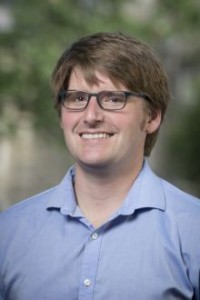 “When I graduated, I was really enthusiastic about building things and I loved finding elegant solutions to problems,” said CS alumnus Craig Fratrik. “I worked for a couple of startups and Microsoft – great opportunities – and grad school wasn’t even on the horizon.”
“When I graduated, I was really enthusiastic about building things and I loved finding elegant solutions to problems,” said CS alumnus Craig Fratrik. “I worked for a couple of startups and Microsoft – great opportunities – and grad school wasn’t even on the horizon.”
But ten years after leaving Rice, he had completed law school and begun a Ph.D. in Economics. His return to academia began while he was working in Silicon Valley and rooming with another Rice CS alumnus, Wade Malone. “Wade was attending law school,” Fratrik said, “and would come in and talk about these really interesting discussions that came up in his classes and I thought, ‘I’m six years out of college, if I’m ever going to make a change, the time is now.’”
Most of his friends and family expected his advanced degree to be in economics. “I was reading a lot of economics blogs and talked about economics a lot,” he said, “but I looked at Ph.D. programs and said, ‘oh no, five or six years is too long, I’ll get a law degree in three years instead.’”
Fratrik said combining a technical degree with a good law school makes a strong student very employable in the field of patent law. “There are really good opportunities for CS students there,” he said, “but I also thought about working in emerging company corporate law.”
Emerging company lawyers help hire a startup’s first employees, deal with investments, and manage all the formalities of getting a company off the ground. “That was probably my most likely career path, if I hadn’t gone on to my Ph.D.,” said Fratrik. “I really liked the dynamism of the startup environment, and I admired the startup community.”
Identifying the difference between what he admired and what he enjoyed was a critical turning point in Fratrik’s decision to pursue a Ph.D. in Economics. Even though he’d worked for a few startups and appreciated the culture, he said, “What I really enjoy is sitting back and thinking about hard problems across a variety of areas – math, computer science, economics, public policy – and then discussing solutions to these really hard problems with other people, to the point that I enjoy that type of challenge even more than building out the solutions.”
Although his career path probably lies in academia, Fratrik believes his foundation in CS will always be applicable. “For one thing, being able to program is pretty important in economics, especially those first two years,” he said. “But there’s so much more to a CS degree, like Marc Andreessen’s quote about software eating the world. It was obvious five or ten years ago that software solutions would be applied to accounting, tax, and other white-collar jobs, but we all thought driving was something only humans could do. Whether it’s health research or self-driving cars, CS is an incredibly versatile degree. You can use those skills and perspective to solve almost any kind of problem.”
Craig Fratrik completed his B.A. with a double major in CS and Mathematics in 2006.
